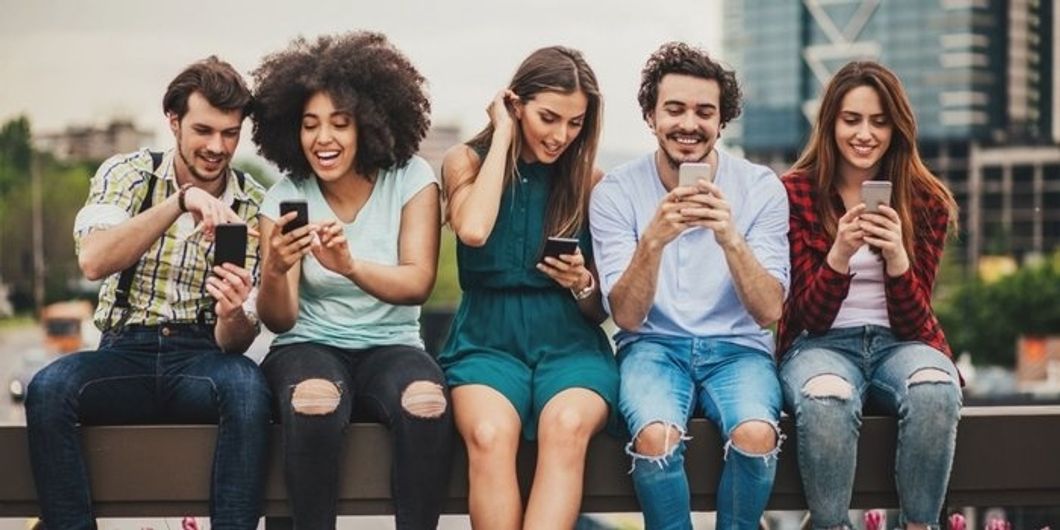It is worth noting that we live in an incredible time in human history. One in which we can, instantaneously, interact with nearly anyone in the world by means of the internet. The entire compendium of human knowledge is simply resting at our fingertips. The advent of the internet has created the ability to learn more about someone's interests, likes and dislikes than ever before and so (inevitably) this led to the rise of platforms where people can connect with one another, irrespective of the distance. As useful and as integral to our daily lives as this has become, social networking has also given rise to a more prevalent and possibly unforeseen reality; one that is responsible for degrading our willingness to meaningfully engage with one another and has catalyzed the proliferation of narcissism and self-consciousness.
This concept outlines the very nature of social media, in that, it is an outlet through which we can express ourselves in the manner in which we want other people to view us. This is an extraordinary capability when viewed through the lenses of social perception and social cognition because it gives us the unique power to alter reality in such a way that portrays us more favorably. Essentially, we are telling other people what they are to believe about our appearance, our likeability, the frequency or variety of our activities, among a multitude of other aspects of ourselves. All that is needed to validate this augmented reality is a few pictures of us in which we appear to be engaged in the aforementioned action or social situation.
Although my position may seem to be pessimistic about the duality between our day-to-day lives, contrasted against who we appear to be online, it is not. I, myself, use similar methodologies in selecting which pictures to post or in choosing what to share or not to share. What we choose to make publicly visible (or to omit) is representative of what we think and who we desire to be. It is, in essence, the manifestation of our mind's eye when gazing introspectively upon ourselves. These benefits do have a limitation, however. If we allow ourselves to intentionally portray a misrepresentation of who we are, such that the portrayal becomes a fallacy, we will ultimately be forced to live a duplicitous life which is neither healthy nor socially acceptable when the truth comes to bare.
Our profiles may represent various aspects of who we are and what activities we engage in but they cannot and do not represent how we interact with other people in a social situation. The most obvious result of this is the disparity and internal conflict that it creates; 'who am I to be, myself or who people think I am?' Expressing oneself with genuineness could risk people distancing themselves since we're not who they thought we were and so we act in such a way that is not who we think we are, nor who others think we are, but how we think others think of us.
Hidden behind the veil of our persona, we are left to embrace the despondency of being chained to the person we've created. They don't know that we're "like that" and so we suppress whatever it is that we think others will disapprove of as if they are expressions of weakness. We are then seen by many yet known by few as the vast majority of those around us (even of whom we'd categorize as friends) are completely oblivious to what's going on beneath the "I'm fine" or "I'm good" front. This is exacerbated by the fact that "how are you" is no longer a questioning of one's condition, but a greeting, and so to respond with little more than "I'm good" would be ill-placed. Instead of bringing joy and a sense of fulfillment, social interactions can cause feelings of awkwardness and regret which only serves to deepen the hesitation to make the same "mistake" again.
The issue is that humans are social by nature and, like an animal raised in isolation, are severely damaged by a lack of meaningful [interpersonal] interactions with others. It is evident that social media is inadequate in filling that void within us all because of its impersonality. When we rely on this as our main source of human interaction, we are sequestering ourselves from the depth that is integral to our happiness and allow loneliness to persist.
Loneliness is real, it is endemic and pervasive. An emotional estrangement, a sense of being cut off from any possibility for depth and future satisfaction. As the drudgery of longing corrodes our soul, rotting the personified and heartfelt emotions we glorify and yearn to experience, our own minds are physically altered from the ensuing depression only to favor and perpetuate the pseudo-expression of self that we plaster over social media.
There is, however, a simple remedy to all of this which can be easily applied whether or not we are the ones afflicted. Being intentional about connecting with other people, beyond that of a superficial level, can make all the difference in the world and may just be exactly what they need. Accept people for who they are, not who you thought they were, and be prepared for what that means; they just might surprise you. Be mindful of the words you choose when engaging with other people and speak in such a way that fosters comfort and expression. Everyone desires the feeling of importance, love and consideration so by exemplifying these things, you just might find that you're not alone either.

















